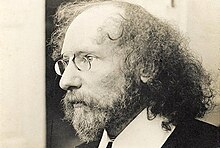Vyacheslav Ivanovich Ivanov
Vyacheslav Ivanovich Ivanov (born February 28, 1866 in Moscow , Russian Empire , † July 16, 1949 in Rome , Italy ) was a Russian philologist , poet and author . He was closely associated with the Russian symbolism movement.
Life
After graduating from the First Moscow High School, Ivanov studied history and philosophy at the Lomonossow University there . In 1886 he went to the Friedrich Wilhelm University in Berlin , where he studied Roman law , economics and archeology with Theodor Mommsen and Otto Hirschfeld, among others . During this time he got to know the thoughts of Friedrich Nietzsche and the German romantics such as Novalis and Friedrich Hölderlin . He continued his studies in archeology in Rome in 1892, where he completed his dissertation .
In Rome Ivanov met the divorced Lydia Zinovieva-Annibal. After they were both divorced under Orthodox canon law , they married in 1899, first moving to Athens , moving to Geneva , and making a pilgrimage to Egypt and Palestine . Ivanov visited Italy very often to study Renaissance art there. His impressions in Lombardy and the Alps were recorded in his first sonnets .
Thoughts on the Dionysus cult and the theater
At the beginning of the 20th century, Ivanov published his views on the Roman Empire and the cult of Dionysus in ancient Greece . His 1904 publication, The Hellenic Religion and the Suffering God , essentially follows Nietzsche's thoughts in The Birth of Tragedy and describes the roots of literature in general and especially of tragedy as derived from the ancient mystery plays .
In 1905 Ivanov published his first collection of works that he had written a decade earlier. Because of their calculated archaic nature, the poems were compared with those of John Milton or Vasily Kirillowitsch Trediakowski . They have been hailed as outstanding examples of Russian symbolism. In the same year he returned to Russia, where he was celebrated as a strange figure. He settled in a tower house opposite the Tauride Palace in St. Petersburg , where he and his wife ran the most famous literary salon. His house was open to other representatives of Symbolism such as the poet Alexander Alexandrowitsch Blok , the philosopher Nikolai Alexandrowitsch Berdjajew , but also artists like Konstantin Andrejewitsch Somow and the playwright and theater director Vsevolod Emiljewitsch Meyerhold .
Ivanov wrote his two plays, Tantalus from 1905 and Prometheus (1919), based on the example of ancient tragedies.
Late years and exile
Ivanov's wife died in 1907. From 1912 to 1913 he traveled to Italy. After his return he met the critic Mikhail Gershenson , the philosopher Sergei Bulgakow and the composer Alexander Scriabin in St. Petersburg . He translated many works from ancient Greece into Russian. In 1920 he moved to Baku in Azerbaijan , where he held the chair of Classical Philology at the local university and wrote his work on the Dionysus cult published in 1923, which was also his doctoral thesis for his doctorate .
It was not until 1924 that Ivanov received a permit to leave the Soviet Union . He went to Rome, where he found a professorship at the Russicum as a professor of the Old Church Slavonic language . In 1937 he converted to the Roman Catholic faith. He died in Rome and is buried on the Cimitero Acattolico .
Works
- in English
- Selected essays . Northwestern University Press, Evanston, Illinois, USA, ISBN 0-8101-1522-0 .
- in German language
- Dyonisos and the pre-Dionysian cults , Eds. Michael Wachtel and Christian Wildberg . Verlag Mohr-Siebeck, Tübingen 2012, ISBN 978-3-16-150208-8 .
- We are two arms of the one cross , poems. Selection, translation and foreword by Christoph Ferber . Edition Raute, Dresden 2011, ISBN 978-3-933777-21-8 .
- Correspondence between two corners of the room / M. Gerschenson and W. Iwanow . Klett-Cotta, Stuttgart 1990, ISBN 3-608-95219-5 .
- The old truth , essays. Suhrkamp, Berlin / Frankfurt am Main 1954.
- Tantalos . Rauch, Dessau 1940.
- in Russian language
- Anima , translated from German by Simon Ljudwigowitsch Frank , Faculty of Philology and the Arts, University of St. Peterburg 2009.
literature
- Johannes Holthusen : Vjačeslav Ivanov as a symbolist poet and as a Russian cultural philosopher . Publishing house of the Bavarian Academy of Sciences, Munich 1982, ISBN 3-7696-1514-X .
- Jurij Murašov: In the Sign of Dyonisos: On Mythopoetics in Russian Modernism using the example of Vjačeslav Ivanov . Fink, Munich 1999, ISBN 3-7705-3340-2 .
Web links
- Short biography and reviews of works by Vyacheslav Iwanowitsch Iwanow at perlentaucher.de
- Biography (russian)
Individual evidence
| personal data | |
|---|---|
| SURNAME | Ivanov, Vyacheslav Ivanovich |
| ALTERNATIVE NAMES | Иванов, Вячеслав Иванович (Russian) |
| BRIEF DESCRIPTION | Russian philologist, poet and author |
| DATE OF BIRTH | February 28, 1866 |
| PLACE OF BIRTH | Moscow , Russian Empire |
| DATE OF DEATH | July 16, 1949 |
| Place of death | Rome , Italy |

